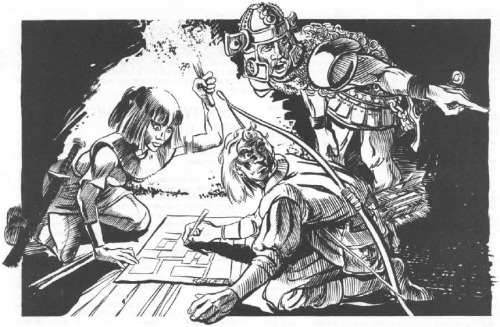There are several games that use perception as a risk-taking procedure, and supply a rule that gives players a mechanic with which to gain an advantage or simply to be warned of impending danger. 3rd edition D&D invented the much abused Spot check, World of Darkness has a derived Perception skill check, Apocalypse World has the Read A Situation move, and many times I've seen a GM who in the absence of a rule for it simply has a PC make a saving throw or a luck check or similar oddity. Using these checks as ways of doling out information is where the inspiration for Trail of Cthulhu came from.
It's a two-way street though, it's important for players to ask questions and prod for more information. Generally, I've noticed that if players just take the scene as described it's because they think their GM gave them all the information they needed. As a player, I am always asking for more details "Is the ceiling a dome or is it flat? How far does the curve in the wall go, all the way to the ceiling? Does it look like there might be a crack or crease where the wall meets the floor?"
Character perception requires player communication.

If a room is trapped, how do detect it if the GM assumes you will just roll dice to discover it? Different games handle discovering traps and pitfalls in different ways. In old school D&D you better have a Thief to search for traps, otherwise you're hosed. In 3rd edition and in Dungeon World anybody could potentially search for traps, some are just better at it than others since in both games it almost entirely relies on your Wisdom bonus. In Dungeon World the existence of a trap might be determined by the dice roll to detect it.
In this same vein, if an NPC is lying to your character how do you detect it? Depending on the GM they might make this obvious, no roll required, but there are mechanics in games for having this kind of interaction with a skilled bluffer. Deadlands made a huge (but broken) mini-game out of the Bluffin' and Scrutinize skills. In some versions of D&D this might just be a saving throw but it could easily be a Sense Motive roll. In Apocalypse World the Read A Person move becomes a catchall for this kind of interaction, which I have noticed most players don't even actually use unless they think violence is imminent.
Sometimes pulling out dice to determine the answer to a question can answer the question for the player, and since the act of rolling might give the players information their characters shouldn't be privy to then how do you imbue that dice roll with failure and success?
Careful scrutiny still requires the possibility of failure.

No comments:
Post a Comment